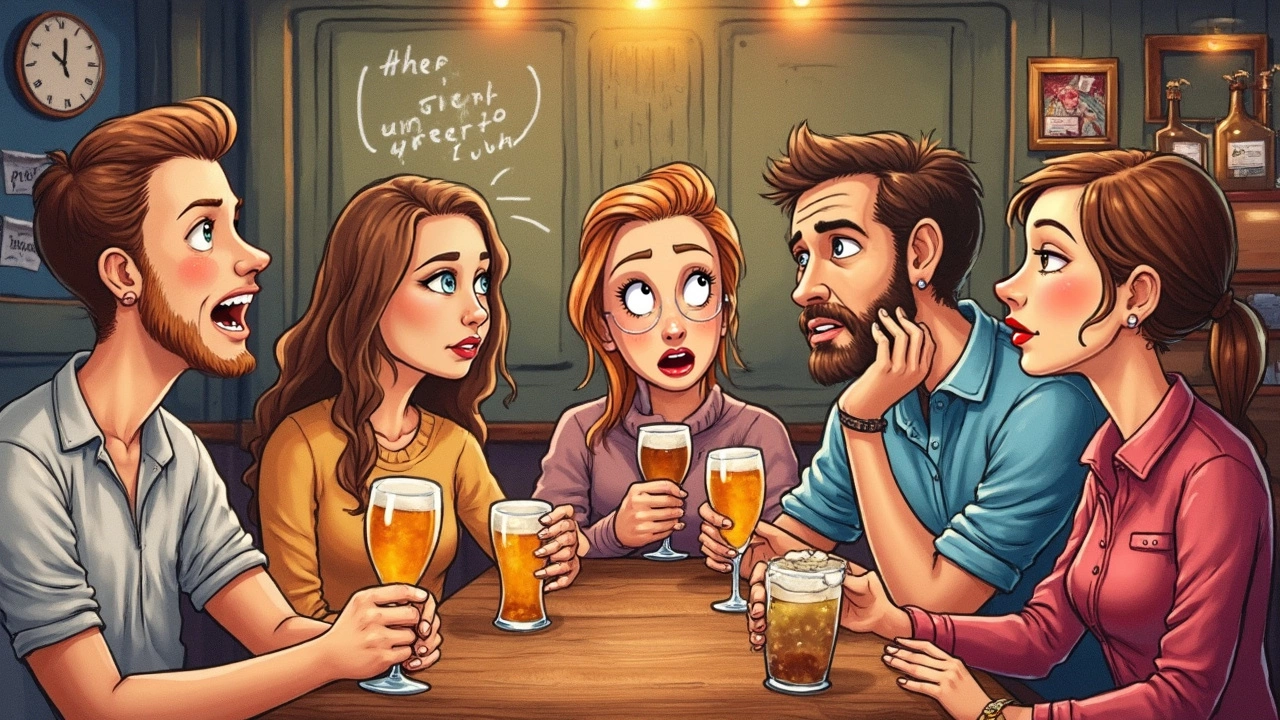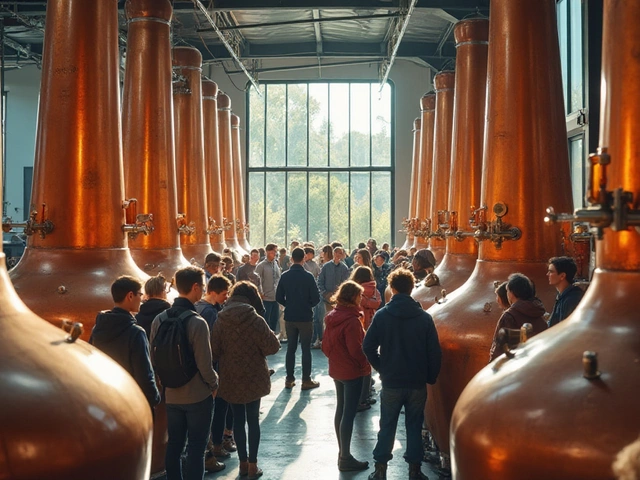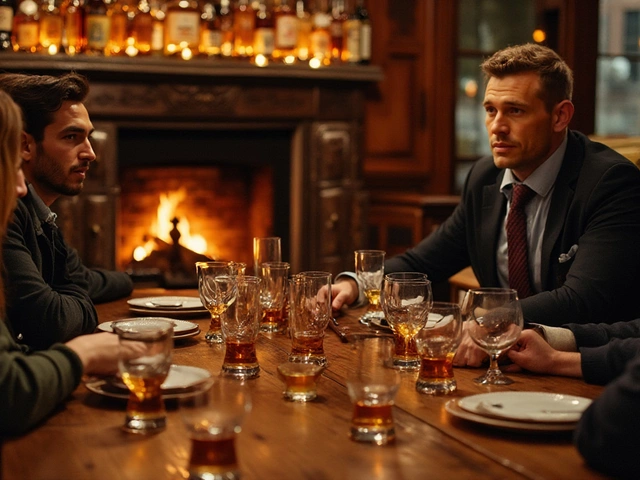Ever taken a sip of alcohol and wondered why it tastes awful to you? You're definitely not alone. Our taste buds are quirky, and the way they react to alcohol is a mix of science, genetics, and personal history. Understanding why alcohol tastes the way it does to you can be enlightening and might even change your experience with spirits.
Let's break down the science first. Your taste perception all starts with the buds on your tongue. These tiny receptors pick up flavors, and alcohol has a complex profile that can be hard to digest, literally. Bitter, sweet, and sour notes all come at you at once. Throw in a sensitivity to bitter tastes, and suddenly that cocktail tastes like medicine.
- The Science of Taste Perception
- Genetic Influences on Taste
- Psychological and Cultural Factors
- Tips for Adjusting to Alcohol Flavors
The Science of Taste Perception
So, why does alcohol taste so weird to some folks? The secret lies in your taste buds and how your brain interprets what they detect. Our tongues have different types of taste receptors for sweet, sour, bitter, salty, and umami. Alcohol taste often dances between these, leaning heavily on the bitter and sometimes sour side, which isn't always pleasant.
Ever noticed how certain flavors pop out more than others when you're sipping that whiskey or vodka? Salivary chemistry plays a part in this. Alcohol interacts with your saliva, releasing flavors, and the whole experience is pretty personal.
Alcohol & Taste Buds
Ever heard the phrase "it's an acquired taste"? That's because our taste buds adapt over time. With alcohol, especially if you're not used to it, the initial experience might be harsh. Bitterness is particularly tricky; around a quarter of us are "supertasters," meaning we taste bitterness more intensely.
The Role of Smell
Don't underestimate your nose! It works closely with taste to provide the full flavor profile. The next time you take a sip, notice the aromas as well. If you're not a fan of bitter tastes, some spirits' strong smells might also be off-putting.
Fun fact: A study once found that some flavors taste different at various room temperatures. Next time you sip, try your drink both cold and at room temperature. The difference might surprise you!
| Temperature | Flavor Perception |
|---|---|
| Cold | Less bitter, more refreshing |
| Room temperature | More pronounced flavors |
We all react to flavors uniquely based on our genetics and, of course, past experiences. If you've had a bad experience with a drink, your brain remembers and influences how you perceive that taste next time around.
Genetic Influences on Taste
Ever wonder why some people can't get enough of that bitter IPA or smoky whiskey, while others cringe at the mere thought? Well, genetics might hold the answer. Our genes play a significant role in how we perceive flavors, especially those found in alcohol.
At the center of this discussion is the TAS2R38 gene. It's connected to our ability to taste bitterness. If you've ever found alcohol particularly unpalatable, it might be because your receptors are more sensitive to bitter compounds. Scientists have discovered several variants of this gene that influence individual taste perceptions, making some of us more likely to wrinkle our noses at certain flavors.
Family Ties Matter
Interestingly, taste preferences can run in families. If your parents didn't enjoy the taste of alcohol, there's a higher chance you might not either. Our inherited TAS2R38 gene variants determine how strongly we react to bitter tastes, including those in spirits.
More Than Just Bitterness
And it's not just about bitter flavors. Other genes come into play, affecting how we perceive sweetness and sourness in drinks. Some folks might find sweetness unpleasant, while others could have a penchant for it. These varying perceptions contribute to why people have such diverse alcohol taste preferences.
| Gene Variant | Effect on Taste |
|---|---|
| Taster | Sensitive to bitterness |
| Non-taster | Less sensitive to bitterness |
Understanding these genetic influences can be eye-opening, especially if you're trying to develop a taste for alcohol or explore new spirits tastings. It turns out, your dislike might not be as irrational as it feels. Exploring your genetic makeup could unlock the reasons behind your palate quirks and preferences.

Psychological and Cultural Factors
Have you ever wondered if your mindset plays a role in disliking alcohol? There's more than just taste buds at play here. Our brains, shaped by personal experiences and cultural context, significantly influence our perception of taste. If you've had a negative experience with alcohol, such as a bad hangover or an embarrassing moment, your brain might associate that memory with the taste, making it seem more unpleasant.
Let's talk about cultural influences. The environment we grow up in shapes our attitudes towards alcohol. In some cultures, drinking is a regular part of family gatherings from an early age, which can ease one into appreciating different flavors. In other cultures, it might be viewed with caution or even disdain, causing one to approach drinking with a negative bias from the get-go.
Social Influence
Peer pressure and social settings also come into play. If your social circle is enthusiastic about alcohol, you might feel compelled to enjoy it, even if you don't initially like the taste. Meanwhile, a group that's indifferent or negative about drinking can reinforce your dislike. It's all about the vibes, really.
- Your initial experience with alcohol, whether good or bad, can have lasting psychological impacts.
- Cultural norms and traditions strongly influence how you perceive the taste of alcohol.
- Peer and social influences can pressure you to conform to particular drinking habits.
Understanding these factors can be the first step in reshaping how you view alcohol. Maybe the taste isn't just what's on your tongue—it's in your mind too. And knowing this, you might start approaching a glass with a different attitude, possibly discovering something new in a sip.
Tips for Adjusting to Alcohol Flavors
Hating the taste of alcohol can be a bummer, especially when it feels like you're missing out. But don't worry, there are ways to ease into it. With a few tricks, you might just find something palatable, maybe even enjoyable.
Start Small
Begin with low-alcohol drinks. Beers or wines with lower alcohol content are less intense, making them easier to sip. They don’t hit your taste buds as hard. Try spritzers or shandies; they have more familiar flavors mixed in, which can help ease your palate.
- Craft beers often offer unique flavors; explore to find something mild and pleasant.
- Light wines can be a gateway; a sweet Moscato or a refreshing Riesling could do the trick.
Experiment with Mixers
Cocktails are another way to mask the taste of alcohol. Mixers can mellow the flavor, making it more approachable. Just be careful with sugar; it can sneak up on you!
- Try a classic cocktail that balances strong alcohol with sweet or sour notes, like a Paloma or Mojito.
- Use mixers you already like — juices, sodas, or even tonic water.
Focus on Temperature and Presentation
Temperature can change how we experience flavors. Cold drinks tend to be less flavorful, which might be a good thing if you're not a fan of alcohol's natural taste.
- Try serving your drinks over ice or as a chilled blend.
- Even the glass you choose makes a difference. The right glassware can enhance certain notes or aromas you're more likely to enjoy.
Give it Time
Taste is partly about exposure. It's possible to develop a taste for something just by trying it a few times. Our taste buds are adaptable, and the more you expose them to strong flavors, the more they might accept them.
| Time Frame | Impact on Taste Acclimation |
|---|---|
| 1-3 weeks | Initial adjustment phase, flavors might seem new and overwhelming. |
| 4-8 weeks | Sensitivity to bitter flavors begins to lessen. |
| 8+ weeks | Taste preferences start to shift, making once-disliked drinks more palatable. |
Adjusting to the flavors of alcohol isn't something that happens overnight. It takes patience and exploration, but with these tips, you might just find a drink you don't entirely hate!


